
The Great Brain Experiment is a unique app for iOS and Android devices which aims to help scientists better understand how the brain works. Developed for neuroscientists at The Wellcome Trust Centre for Neuroimaging and UCL, in collaboration with The Wellcome Trust, for Brain Awareness Week, the app contains four games, each of which measures a specific brain function. The app is designed to make players more aware about how their brain works. It also reports data on the players’ performance back to the scientists who will be able to use them to learn about how brain function varies in the population and also how it changes as we age.
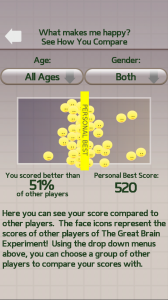
Your score is compared to other players
The Brief
The Wellcome Trust contacted White Bat Games with a good idea of what they wanted, but felt that our games experience would help them ‘gameify’ the whole experience and make it attractive to the general public. They wanted people to have fun while participating and that was something we kept in mind throughout the project, trying to balance the needs of the experiments with the game’s entertainment value. We relished the chance to produce a mobile game with loftier goals than just killing time!
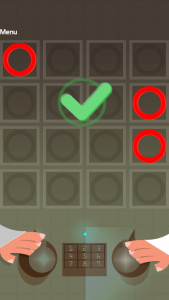
How much can I remember?
We experimented with the art style, looking at games that are out there and ones that have tried to be educational and making a judgement about what would work for the target audience. A bright, vector-graphic-style art style emerged from this, and the eventual result of that was our two scientists Dennis and Sarah who guide the player through the game.
Lots of discussion was had on the type and amount of feedback to give, as we wanted the player to understand what was happening but not have the feedback affect their behavior and so the results of the experiment.
The Games
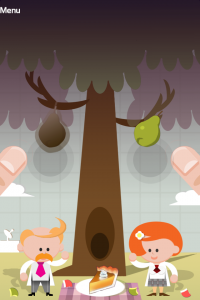
Am I impulsive?
In ‘Am I impusive?’, the player must touch fruit as it falls out of a tree. If the fruit turns bad half way down, the player must resist tapping it. This game is designed to study the urges that control our actions, and how difficult it is to stop an action just before we’re about to perform it. People with addictions or ADHD are worse at stopping these urges, and this game aims to provide statistics on how this capability varies.
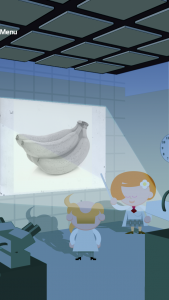
How much do I see?
The fourth game, ‘What makes me happy?’, is a test of the player’s judgement. The player must make a choice about taking a chance risking their points to get a reward, or take the safer but less rewarding option. Scientists think that differences in judgement could be down to differences in brain chemistry or even your genes! By asking how happy the player is after each choice, scientists hope to be able to see how positive or negative reinforcement affects people’s happiness.
The Technology
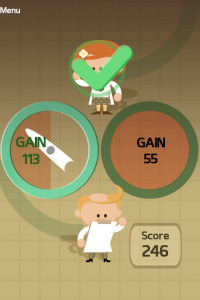
What makes me happy?
Enjoy!
We’re please with how the game turned out, and hope it will find its way into many people’s hands.







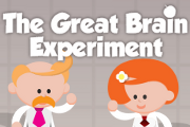 The Great Brain Experiment
The Great Brain Experiment Pride and Prejudice
Pride and Prejudice
